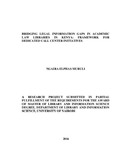| dc.description.abstract | The purpose of this study was to determine whether a dedicated call center initiative within academic law library can bridge legal research information gap. The objectives of the study were to establish the level of awareness of call center services in bridging legal research information gap among clients of academic law libraries, evaluate the role of call center initiative in bridging legal research information gap in academic law libraries, Find out the approaches applied to bridge legal research information gap in academic law libraries and develop appropriate framework for a dedicated call center initiative for bridging legal research information gap in law libraries in Kenya. The study adopted a mixed data collection methods including current literature, document analysis and questionnaire whose reliability was tested using cronbach’s alpha. The conceptual framework was hinged on information gap independent variable and causes as dependent variable. Customer’s awareness for library services determined the gap degree whose remedial strategies would be suggested. This was a quantitative research that reviewed various streams of literature on call center strategy and businesses. Questionnaire and observation was employed. A sample of 259 respondents from a population of 2594 was used in the study. Survey results elicited presence of a wide gap tested through awareness question between legal research information clients of two academic law libraries and the core call center services; inquiries, transactions, requests and relationship. Statistical Package for the Social Sciences version 16.0 was adopted in analyzing the data for presentation. Findings acknowledged the role and benefits of call centers and therefore it is viable in the library setting and capable of revolutionizing service delivery. First, call centers are indeed very integral in academic law libraries, provides 24/7 risk free services, reliable and satisfactory approach to legal information gap, as well as one-stop legal information point using telephony technology. The study was vital to academic law libraries in their quest to diversify service delivery vide adoption innovative technologies like call center initiative to reduce glaring information gap risk with customers. These positive results would improve audience satisfaction and increasing loyalty through sustainable service access and visibility. Researchers must deeply look into root causes of legal research information gap in law libraries and adoptable innovative approaches for mitigation. It guarantees a sustainable seamless service brand via co-creation. | en_US |

